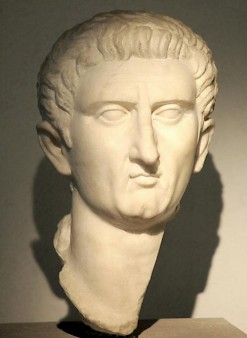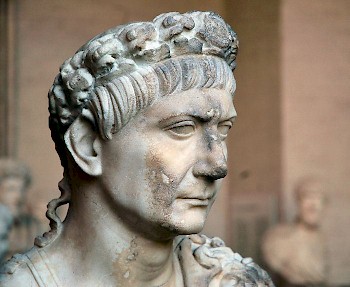Pliny the Younger (4)
Pliny the Younger or Gaius Plinius Caecilius Secundus (62-c.115): Roman senator, nephew of Pliny the Elder, governor of Bithynia-Pontus (109-111), author of a famous collection of letters.

The assassination of the emperor to whom he owed his career did not have consequences for Pliny, who remained prefect of the military treasury. If Pliny had the reputation of being a collaborator of the paranoid Domitian, he had been able to convince everybody that his reappointment was a guarantee for the continuity of government. This was typical: many other people involved in the management of the Roman empire, retained their office.
In 97, Pliny attacked Publicius Certus, who had prosecuted Helvidius Priscus, one of the stoics executed by Domitian and a personal friend of Pliny. In one of his letters he tells us why he attacked Publicius, and gives a remarkable impression of the priorities of a Roman senator: "This was a truly splendid opportunity for attacking the guilty, avenging the injured, and making one-self known".note He certainly made himself known: his speeches In vindication of Helvidius were published after Pliny had won his case. It must have given Pliny a first taste of literary success.
The lawsuit itself had not been without difficulties, however. Pliny was advised by someone to desist because he would make himself "a marked man in the eyes of future emperors". Another one told him that Publicius was befriended with the governor of Syria. This is an interesting comment, because it proves that everybody expected that Nerva would appoint this man, Publius Cornelius Nigrinus Curiatus Maternus, as his successor. However, at the end of the debate, Pliny found himself victorious. Publicius' career was broken, and his accuser noted that he had "freed the Senate from the odium in which it was held for showing severity to others while sparing its own members".
A few days after Pliny's speech, Publicius was found dead. He had been prefect of the treasury of Saturn, which meant that he was responsible for a large part of the finances of the empire. Nerva now appointed Pliny in Publicius' place. This shows that the man from Como really must have been a clever accountant, but also that the emperor was impressed by Pliny's action against Publicius. It had been his ambition "to make himself known", and now he harvested the fruits.
In the same year, Pliny was seriously ill, and his second wife died, perhaps of the same disease. We know almost nothing about her, except that she was the daughter of a woman named Pompeia Celerina. Her name is unknown. If she had married a man who was ten years older (as was customary in Antiquity), she was about twenty-five and may have died in childbirth. About Pliny's first wife we only know that she existed.
In the meantime, the generals of the armies of the Rhine and Danube and several senators were consulting on their attitude to the choice of Nerva's successor. They agreed that the new emperor ought to be Trajan, the governor of Germania Superior, and in October 97, Nerva adopted the man chosen by the armies. Three years later, Pliny compared this event to an abdicationnote and this is hardly exaggerated. Four months later, the old man died.

Probably, Pliny was involved in this silent coup, although there are indirect indications. However, he occupied a very important function, and had made his name as a courageous man not deterred by the influence of Trajan's rival Cornelius Nigrinus. It is possible that Pliny's attack on Publicius Certus was meant as an attack on Cornelius Nigrinus.
In any case, Trajan retained Pliny as prefect of the treasury of Saturn and promised to make him consul when his term as prefect was over. The new emperor also gave Pliny the privileges granted to parents of three children. This was a really kind gesture towards the man who had recently become widower.
In 99 or 100, Pliny and his friend, the historian Tacitus, were involved in a lawsuit against one Marius Priscus, former governor of Africa, who was forced to plead guilty. Pliny spoke with so much enthusiasm, that he did not understand that the emperor requested him to keep his speech brief.
My speech lasted for nearly five hours, for I was allowed four water-clocks in addition to my original twelve of the largest size [...]. The emperor did indeed show such an attentive and kindly interest in me (I should not like to call it anxiety on my behalf) that more than once, when he fancied I was putting too much strain on my rather delicate physique, he suggested to my freedman standing behind me that I should spare my voice and lungs.note
In September and October 100, Pliny and his friend Gaius Julius Cornutus Tertullus were consul. During the empire, the office had, of course, lost much of its former importance, but it was still prestigious. Pliny was chairman of the Senate, organized gladiatorial contests (a.o. on 18 September, Trajan's birthday), and was judge in several cases.
At the age of 38, he had reached the highest office in the Roman empire. It had been a dazzling career, especially for someone who was not born as a senator's son. His father and uncle had every reason to be very content with the younger Pliny.